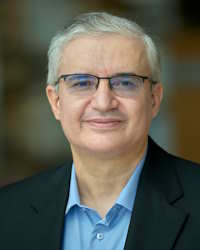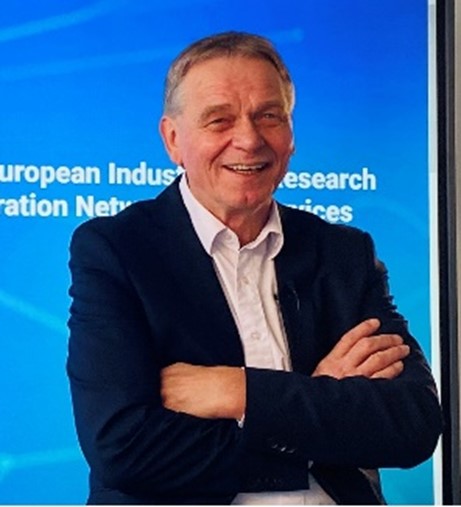KEYNOTE 1: Mohamed-Slim Alouini, KAUST, Saudi Arabia
Date: Tuesday, 25th June | Room: Giorgi Nikoladze Hall
TITLE
Towards Connecting the Remaining 3 Billion
ABSTRACT
The transformative influence of Internet and Communication Technology (ICT) has reshaped society, touching every aspect from the economy to healthcare. As the widespread deployment of 5G continues, there is an on-going focus on the inception of the sixth generation (6G) of wireless communication systems (WCSs). Anticipated to shape the future of connectivity in the 2030s, 6G aims to deliver unparalleled communication services to meet the demands of hyper-connectivity.
While densely populated urban areas have traditionally been the primary beneficiaries of WCS advancements, the vision for 6G transcends city limits. Aligned with the United Nations' sustainability goals for 2030, an important aspect of 6G endeavors to democratize the benefits of ICT, fostering global connectivity sustainably.
This talk delves into this particular envisioned landscape of 6G, providing insights into the future of wireless communication and guiding research efforts towards sustainable, inclusive, and high-speed connectivity solutions for the future. Central to this discussion are two emerging technologies: Free Space Optics (FSO) and Non-Terrestrial Networks (NTN). These innovative solutions hold the promise of extending high-speed connectivity beyond urban hubs to underserved regions, fostering digital inclusivity and contributing to the development of remote areas. Through this exploration, we aim to convey the potential of 6G and its role in shaping a connected, sustainable future for all.
BIOGRAPHY
 Mohamed-Slim Alouini was born in Tunis, Tunisia. He received the Ph.D. degree in Electrical Engineering from the California Institute of Technology (Caltech) in 1998. He served as a faculty member at the University of Minnesota then in the Texas A&M University at Qatar before joining in 2009 the King Abdullah University of Science and Technology (KAUST) where he is now the Al Khawarizmi Distinguished Professor of Electrical and Computer Engineering. Prof. Alouini is a Fellow of the IEEE and OPTICA (Formerly the Optical Society of America (OSA)). He is currently particularly interested in addressing the technical challenges associated with the uneven distribution, access to, and use of information and communication technologies in rural, low-income, disaster, and/or hard-to-reach areas.
Mohamed-Slim Alouini was born in Tunis, Tunisia. He received the Ph.D. degree in Electrical Engineering from the California Institute of Technology (Caltech) in 1998. He served as a faculty member at the University of Minnesota then in the Texas A&M University at Qatar before joining in 2009 the King Abdullah University of Science and Technology (KAUST) where he is now the Al Khawarizmi Distinguished Professor of Electrical and Computer Engineering. Prof. Alouini is a Fellow of the IEEE and OPTICA (Formerly the Optical Society of America (OSA)). He is currently particularly interested in addressing the technical challenges associated with the uneven distribution, access to, and use of information and communication technologies in rural, low-income, disaster, and/or hard-to-reach areas.
KEYNOTE 2: Dr.-Ing. Dipl.-Phy. Egon A. Schulz, Huawei Technologies Duesseldorf GmbH, Germany
Date: Wednesday, 26th June | Room: Giorgi Nikoladze Hall
TITLE
Innovative 6G
ABSTRACT
Approximately every ten years wireless technology will go through a revolution and we will define every ten the next generation of mobile networks.
The global progress in the 6G research is promising, the new use cases and new enabling technologies have been identified and major foundational capabilities will be presented: The native AI, the integrated sensing & communications, the extreme connectivity, the integrated terrestrial and non-terrestrial networks, trustworthiness and sustainability.
In this talk we emphasize that the 6G capabilities can take the vertical industries to a new level of play. 6G will help us to redefine our life and work.
BIOGRAPHY
 Dr. Schulz has more than 40 years’ experience in Mobile Communication Services, Research & Innovation, Product and Solution Creation Processes: Terminal & Infrastructure, Spectrum, Prototyping, Standardization, National/International Collaboration and Product oriented Research (PoR). He is an earnest practitioner of European leadership and supporting the global standardization unification. In 1988 he joined the Mobile Network Division at Siemens AG, Munich. In April 2007 he became a member of Nokia Siemens Networks (NSN), Munich. In 2009, Dr. Schulz joined the Huawei’s Munich Research Center and led the advanced technologies research. He was strongly engaged in 5G/B5G research in particular in 5GPPP projects for designing, validation and verification. He has a clear view of European wireless research & development and published numerous papers. Dr. Schulz’s current research work focuses on 6G. His main activities are designing and structuring Huawei’s internal and external 6G research activities. Moreover, he is Board Member of the European Technology Platform (ETP) NetworldEurope and actively contribute to the NetworldEurope SRIAs and is committed to the 6G-IA/SNS Board.
Dr. Schulz has more than 40 years’ experience in Mobile Communication Services, Research & Innovation, Product and Solution Creation Processes: Terminal & Infrastructure, Spectrum, Prototyping, Standardization, National/International Collaboration and Product oriented Research (PoR). He is an earnest practitioner of European leadership and supporting the global standardization unification. In 1988 he joined the Mobile Network Division at Siemens AG, Munich. In April 2007 he became a member of Nokia Siemens Networks (NSN), Munich. In 2009, Dr. Schulz joined the Huawei’s Munich Research Center and led the advanced technologies research. He was strongly engaged in 5G/B5G research in particular in 5GPPP projects for designing, validation and verification. He has a clear view of European wireless research & development and published numerous papers. Dr. Schulz’s current research work focuses on 6G. His main activities are designing and structuring Huawei’s internal and external 6G research activities. Moreover, he is Board Member of the European Technology Platform (ETP) NetworldEurope and actively contribute to the NetworldEurope SRIAs and is committed to the 6G-IA/SNS Board.
KEYNOTE 3: Erdal Panayirci, Kadir Has University, Türkiye
Date: Thursday, 27th June | Room: Giorgi Nikoladze Hall
TITLE
Visible Light Communications with Physical-Layer Security
ABSTRACT
Optical Wireless Communications (OWC) and one of its potential applications, Visible Light Communications (VLC) offer significant technical and operational advantages. With attractive features such as high bandwidth capacity, robustness to electromagnetic interference, high degree of spatial confinement, inherent security, and unregulated spectrum, OWC, as well as VLC, stand out as powerful alternatives and complementary technologies to the existing radio frequency-based wireless systems for a wide range of applications. During the past few years, physical-layer security (PLS) in point-to-point and multiuser VLC networks has emerged as a promising approach to complement conventional encryption techniques and provide the first line of defense against eavesdropping attacks. It will undoubtedly have potential application in 6G. In this presentation, after briefly introducing VLC, we introduce two new and novel schemes for PLS in VLC based on spatial modulation (SM) and MIMO-OFDM transmission with generalized LED index modulation.
BIOGRAPHY
 Dr. Erdal Panayirci received a Diploma Engineering degree in electrical engineering from Istanbul Technical University, Istanbul, Türkiye, and a Ph.D. degree in electrical engineering and system science from Michigan State University, East Lansing, MI, USA. He is currently a Professor at the Electrical and Electronics Engineering Department at Kadir Has University, Istanbul. He holds a visiting research collaborator position with the Department of Electrical Engineering, Princeton University, Princeton, NJ, USA. He has published extensively in leading scientific journals and international conferences and coauthored the book Principles of Integrated Maritime Surveillance Systems (Kluwer Academic, 2000). His research interests include communication theory, synchronization, advanced signal processing techniques, and their applications to wireless electrical, underwater, and optical communications. He has served as a member of the IEEE Fellow Committee from 2005 to 2008 and from 2018 to 2020 and the IEEE GLOBECOM/ICC Management and Strategy Standing Committee from 2017 to 2020. Currently, he is a member of the IEEE ComSoc Awards Standing Committee. He served as the Technical Program Co-Chair, the General Co-Chair, and the Technical Program Chair for several IEEE ICC, IEEE PIMRC, and IEEE WCNC conferences. He was an Editor of IEEE 1261 TRANSACTIONS ON COMMUNICATIONS in synchronization and equalization 1262 from 1995 to 2000. He is an IEEE Life Fellow and a member of the National Academy of Sciences, Türkiye.
Dr. Erdal Panayirci received a Diploma Engineering degree in electrical engineering from Istanbul Technical University, Istanbul, Türkiye, and a Ph.D. degree in electrical engineering and system science from Michigan State University, East Lansing, MI, USA. He is currently a Professor at the Electrical and Electronics Engineering Department at Kadir Has University, Istanbul. He holds a visiting research collaborator position with the Department of Electrical Engineering, Princeton University, Princeton, NJ, USA. He has published extensively in leading scientific journals and international conferences and coauthored the book Principles of Integrated Maritime Surveillance Systems (Kluwer Academic, 2000). His research interests include communication theory, synchronization, advanced signal processing techniques, and their applications to wireless electrical, underwater, and optical communications. He has served as a member of the IEEE Fellow Committee from 2005 to 2008 and from 2018 to 2020 and the IEEE GLOBECOM/ICC Management and Strategy Standing Committee from 2017 to 2020. Currently, he is a member of the IEEE ComSoc Awards Standing Committee. He served as the Technical Program Co-Chair, the General Co-Chair, and the Technical Program Chair for several IEEE ICC, IEEE PIMRC, and IEEE WCNC conferences. He was an Editor of IEEE 1261 TRANSACTIONS ON COMMUNICATIONS in synchronization and equalization 1262 from 1995 to 2000. He is an IEEE Life Fellow and a member of the National Academy of Sciences, Türkiye.



